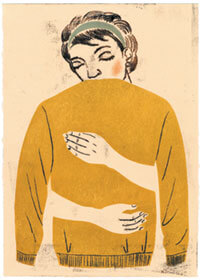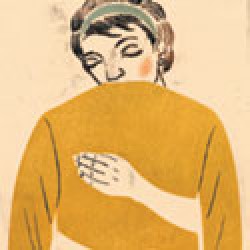Personal Peace

Edel Rodriguez
Robert Enright believes that learning to forgive is not a weakness at all – but a powerful act that brings healing and happiness.
Robert Enright is locked in an existential battle with a dead, but very influential, German philosopher.
Friedrich Nietzsche equated forgiveness with weakness, calling it “sublimated resentment.” That way of thinking persists today in our culture, where power and winning are celebrated, and showing mercy to those who have done us wrong is seen as condoning their crimes. But that thinking is quite the opposite of what drives Enright, a UW–Madison professor of educational psychology.
“It takes great strength to be merciful toward someone who has wounded us,” he says.
Enright has spent more than twenty-five years researching and proving a hypothesis some colleagues thought lacked academic merit: that forgiveness is an achievable virtue and a powerful act that can help people let go of anger toward those who have caused pain, allowing them to embark on a path to healing and happiness. Time and again, with different people in different circumstances, his research — supported in part by private donors — has shown that forgiveness works.
“There’s so much injustice in the world, so much imperfection, and just living in the world means people disappoint us and people will be unfair to us,” he says. “And we need a response to that, and it shouldn’t always be to fight them.”
Enright’s work resides in the most difficult places of human experience, where there is endless pain, loss, and suffering. He has worked with and studied adult survivors of incest and schoolchildren on opposite sides of deep-seated religious conflict in Belfast, Northern Ireland. His more recent efforts focus on making forgiveness part of everyday life — not just when something unspeakable occurs — and a lens through which we can view the world.
A Twenty-Step Program
Marianne Rosen was a communication arts graduate student at the UW in the 1990s when she spotted an ad in the Daily Cardinal seeking participants for a blind study. Whoever wrote it, she thought, knew what she had been through.
Were you a victim of abuse, and do you still harbor anger at your perpetrator?
The question jumped from the pages of the newspaper, because it tapped into feelings that still weighed heavily on Rosen more than twenty years after the death of her father, who sexually and emotionally abused her as a child. “I was just tired of hating him, and I didn’t know any other way to react to what had happened to me,” Rosen says.
She was happily married with two young children and enjoying her work as a teaching assistant, but the past still got in the way of the present. One evening, Rosen was giving her one-year-old daughter a bath and had a severe panic attack. Her mother, visiting from Chicago, had to take over. “I was suddenly remembering what it was like to be a very young child and to have been abused by my father. It was just overwhelming for me,” she says. “That certainly wasn’t an isolated incident.”
With hope for a better way forward, Rosen joined a fourteen-month forgiveness intervention program for incest survivors designed by Enright and then-graduate student Suzanne Freedman MS’91, PhD’94, who was conducting the study as her dissertation research. The women in the study were experiencing depression, low self-esteem, and high anxiety.
Rosen met weekly with Freedman for hour-long sessions to work through her pain, grief, and anger over the abuse — early steps in the forgiveness process. At one of those meetings, Freedman asked Rosen to draw herself at age eight or nine. The resulting portrait showed a girl in a bed with two eyes and a nose, but no mouth, while another girl, her facial features intact, floated above. “It’s very common for children who have been abused to sort of disassociate themselves from what was happening,” Rosen says. “I just felt so sorry for that little girl and everything that she had gone through. It was one of the most powerful experiences I had had.”
The forgiveness education program has twenty steps, divided into four phases that represent a road map to forgiveness: uncovering anger, deciding to forgive, working on forgiveness, and discovery and release from emotional prison. (See sidebar.) None of the steps are quick or easy. Admitting the injury and dealing with the emotional pain that resulted — both steps in the process — are some of the biggest roadblocks to forgiveness.
“We’re a society that really wants to cast off our pain,” says Freedman, now an associate professor at the University of Northern Iowa who continues to study forgiveness and believes firmly in its power. “We keep ourselves so busy, we don’t have to deal with our past. We use drugs [and] alcohol to numb ourselves.”
Years before she contemplated the idea of forgiving her father, Rosen felt only relief when she learned of his suicide. “I never cried,” she recalls. She looked at her mother, who relayed the news, asked, “So?” and walked away. She was eleven years old.
A Powerful Act
The concept of forgiving someone for an unthinkable act is not without its detractors. Critics who don’t understand how the process works call it a quick fix, and some suggest that forgiving somehow condones the wrongdoing or promotes reconciliation.
“We don’t develop moral amnesia. … I’ve never worked with anybody who forgets the atrocities that have been perpetrated on them,” Enright says. “You can forgive someone you don’t trust. You can forgive someone you don’t trust and not let them babysit your children. … When you forgive, you don’t throw justice out the window.”
Others have gone as far as calling forgiveness anti-feminist, arguing that it makes women give away their power by asking them to let go of anger. But anger is critical to forgiveness. In fact, confronting anger is one of the earliest steps in the lengthy and arduous process.
“Research talks about how debilitating anger is,” Freedman says. “At first, it feels powerful, because you know you’re in the right and the person hurt you. But after a while, it gets old. [You ask yourself], ‘Okay, I’m justified in my anger, but what’s it doing for me?’ ”
One of the most essential parts of the process for Rosen was addressing the anger about the abuse that she carried with her. “Anger is kind of self-perpetuating,” she explains. “You can be angry with somebody, and then you’re just kind of feeding into that anger and being an angry person inside.”
Freedman says that for many survivors, finding out that their abusers were abused themselves or had difficult childhoods in other ways reframes the situation, leading to feelings of empathy and compassion toward them. However, she notes, reframing doesn’t mean excusing behavior or saying that what happened was okay. Instead, it allows a survivor to see the greater context surrounding the injury.
Releasing her anger opened the door for Rosen to recognize the events in her father’s childhood that had contributed to who he was as a person and how he acted.
“The whole process of learning to look at things from a distance and see a bigger picture has allowed me to be very mindful. And I think mindfulness can lead you to gratitude, which is also, I believe, what forgiveness is about,” Rosen says. “Yes, what happened to me should not have happened. It shouldn’t happen to any child … I can’t say, ‘Oh, yay, so glad I went through that.’ But thank goodness I was introduced to this concept.”
Before the study, there was no specific acknowledged treatment in the field of psychology for helping victims of incest to heal, Enright says. After completing the intervention program, members of his experimental group were no longer clinically depressed and no longer highly anxious. They had hope for the future, their self-esteem rose, and their relationships with others improved — and that was still the case in a follow-up study conducted fifteen years later.
Right after completing the program, Rosen drove from Madison to her father’s burial site in Chicago. In the Jewish tradition, she placed a pebble on top of his gravestone to signify her visit.
“I sat there and I just sobbed, and I said, ‘I understand, I understand, and I’m so sorry that happened, I wish we’d had a chance to talk.’ I haven’t been back since,” she says. “But that’s the power of forgiveness, of putting things in perspective and moving on.”
Today, Rosen works as a high school teacher and debate coach in southern California. “I don’t think it’s merely coincidental that I teach children how to have a voice,” she says.
Forgive Daily
Enright has successfully tested his program with a number of groups, including third-graders in Milwaukee’s central city and Belfast; college students; drug rehab participants; and adult children of alcoholics. More recently, the curriculum he developed for schools to teach kids about forgiveness has been adopted by the government of Ellen Johnson Sirleaf, president of Liberia and Nobel Peace Prize winner, in an effort to move the country beyond a fourteen-year civil war.
Enright believes forgiveness is a virtue that should be embraced — not just by people who have endured grave injustice and suffering, but also in smaller moments where we feel slighted, overlooked, or even annoyed by spouses, parents, or friends. It takes time and commitment to be what Enright calls “forgivingly fit.” He compares it to rehabbing a blown-out knee, because he wants people to understand that work — and pain — are involved.
“ Anyone who practices rigorous, physical exercise regularly will tell you that it is part of their identity. It’s part of who they are, and if they cannot exercise for a while, it’s uncomfortable,” he says. “It’s the same thing with the forgiving life. As you make it part of the exercise of your life, it gradually becomes part of who you are.”
So what does that mean in a practical sense? It means that you must learn to forgive daily, Enright says.
“It does not make you weak,” he says. “The love you cultivate and develop in your heart is stronger than any injustices anyone can ever throw against you. And once you live that, you realize how very, very strong you can be, because that’s a buffer against all of the poison that unfortunately visits us just by being alive.” n
Jenny Price ’96 is senior writer for On Wisconsin.
Published in the Spring 2013 issue



Comments
Bob Frykenberg March 11, 2013
Superb!! The world needs this.
CSStevens March 16, 2013
Forgiveness sets a person free to continue on in life. Stunted growth is the result of unforgiveness. Forgiveness gives us more of a capacity to love those who pass through our lives. I so appreciated this article in On Wisconsin-touching on the ‘unseen’ things in life & giving it credibility.
Same for the article on Dignity. We are ALL equal & of great worth. With forgiveness reigning in our lives we can extend the dignity of worth to those around us. These principals go hand in hand.
Patty March 18, 2013
This was a very good article.
When my husband had an affair (15 years into our 30 year marriage) I decided to forgive him. I decided we still loved each other and that love should win.
So I started to pretend I had forgiven him. I acted, spoke, and responded to him as if I had forgiven him.
That was my first stage. It eliminated snarking guilt induced responses that I kind of wanted to make.
Eventually, I realized I had forgiven him.
I feel good. We both feel loved.
Michelle May 17, 2013
yes, the world most certainly needs this. Amazing that most of life’s virtues (forgiveness, happiness, etc.) are things that have to worked on and exercised.
Typically, its thought that these are things can be easisly achieved, and should sustain you for a lifetime without practice and diligence.